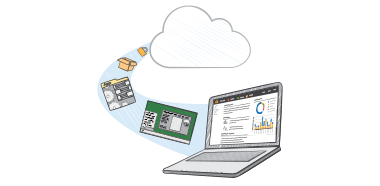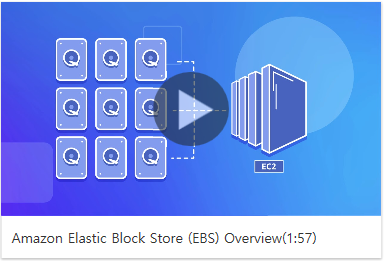|
|
|
 |
AWS Elastic Block Store(EBS)는 AWS 클라우드의 AWS EC2 인스턴스에 사용할 영구 블록 스토리지 볼륨을 제공합니다. 각 AWS EBS 볼륨은 가용 영역 내에 자동으로 복제되어 구성요소 장애로부터 보호해주고, 고가용성 및 내구성을 제공합니다. AWS EBS 볼륨은 워크로드 실행에 필요한 지연 시간이 짧고 일관된 성능을 제공합니다. AWS EBS를 사용하면 단 몇 분 내에 사용량을 많게 또는 적게 확장할 수 있으며, 프로비저닝한 부분에 대해서만 저렴한 비용을 지불합니다.
AWS EBS는 성능, 비용 및 용량을 미세 조정하는 이점을 활용할 수 있는 애플리케이션 워크로드를 위해 설계되었습니다. 빅 데이터 분석 엔진(하둡/HDFS 에코시스템, AWS EMR 클러스터 등), 관계형 및 NoSQL 데이터베이스(Microsoft SQL Server, MySQL, Cassandra, MongoDB 등), 스트림 및 로그 처리 애플리케이션(Kafka, Splunk 등), 데이터 웨어하우징 애플리케이션(Vertica, Teradata 등)을 일반적인 사용 사례로 들 수 있습니다.
AWS EBS 소개
|
장점 |
 |
안정적이며 안전한 스토리지
AWS EBS의 각 볼륨은 자동으로 가용 영역 내에 복제되므로 구성 요소에 장애가 발생하더라도 안전합니다. AWS EBS 암호화는 상주 데이터의 보안은 물론 EC2 인스턴스와 EBS 볼륨 간에 이동하는 데이터의 보안도 원활하게 지원합니다. Amazon의 유연한 액세스 제어 정책은 특정 EBS 볼륨에 액세스할 수 있는 사람을 지정할 수 있게 해줍니다. 액세스 제어와 암호화를 함께 사용하는 것은 데이터를 심층방어하는 강력한 보안 전략입니다.
|
|
|
지연 시간이 짧은 일관된 성능
AWS EBS 범용(SSD) 볼륨 및 AWS EBS 프로비저닝된 IOPS(SSD) 볼륨은 SSD 기술을 통한 짧은 지연 시간과 애플리케이션의 요구 사항에 맞는 일관된 I/O 성능을 제공합니다. 여러 볼륨을 함께 스트라이프할 수 있기 때문에 I/O 성능이 더욱 향상됩니다.
|
 |
|
 |
백업, 복원, 혁신
AWS EBS 볼륨의 point-in-time 스냅샷을 생성하여 데이터를 백업합니다. 새로운 EC2 인스턴스를 생성할 때 AWS EBS 스냅샷을 사용할 수 있어 비즈니스 민첩성이 향상됩니다.
|
|
|
빠르게 확장 및 축소
블록 스토리지 및 성능을 몇 분 만에 확장 및 축소할 수 있어 원하는 대로 자유롭게 조절할 수 있습니다. 수천 개의 볼륨이 동시에 작동합니다.
|
 |
|
 |
지리적 유연성
AWS EBS는 AWS 지역 간 스냅샷 복사 기능을 제공하여 지리적 확장, 데이터 센터 마이그레이션 및 재해 복구가 가능합니다.
|
|
사용 사례 |
| AWS EBS는 수백만 명의 게이머나 수억 건에 달하는 전자 상거래 트랜잭션을 지원하는 등 사용자의 필요에 맞게 확장됩니다. Oracle, Microsoft SQL Server, MySQL 및 PostgreSQL 등의 데이터베이스는 AWS EBS에 광범위하게 배포되어 있습니다. |
| AWS Case Study: Supercell |
About Supercell |
| Finland-based Supercell, founded in 2010 by 6 game industry veterans, is one of the fastest-growing social game developers in the world. With a staff of just over 100 employees, Supercell’s three games-Hay Day (a social farming game), Clash of Clans (a social resource management game with strategic combat), and Boom Beach (combat strategy game, released on March 2014)-attract tens of millions of players on iOS and Android devices every day. |
The Challenge |
“When Supercell launched,” says Sami Yliharju, Services Lead, “the founders knew they wanted to create a company where the focus would be on the best people building the best games.” Building games specifically for tablets helps them focus their energy on creating the best experience for gamers-and working in small development teams, or cells, helps too. Each game team or cell is unique, but usually includes a lead, a game designer, an artist, a server developer and a coder.
The small development teams at Supercell needed not only cloud computing services that were easy to use, powerful and reliable, but also a set of services that matched their requirements for high-volume game performance, scalability and rapid growth. “Scalability, performance and reliability are essential for us,” Yliharju says. “Using AWS was an easy choice." |
Why AWS Web Services |
Supercell’s games require hundreds of servers to provide functionality for players. For each of its players, Supercell needs a session on the server side - and the number of servers that are required grows with the number of users playing. Additional server power and session management are necessary to run the games’ social features and to monitor gamesmanship - in other words, to ensure that no one cheats. “Our massive scale of infrastructure would be very hard to maintain on regular on-premise hardware, especially as the success of the feature pushes cannot be predicted beforehand,” Yliharju says.
Supercell is using AWS Kinesis for real-time delivery of game insight data sent by hundreds of game engine servers. “AWS Kinesis enables our business-critical analytics and dashboard applications to reliably get the data streams they need, without delays,” Yliharju says. “AWS Kinesis also offloads a lot of developer burden in building a real-time, streaming data ingestion platform, and enables Supercell to focus on delivering games that delight players worldwide.”
The company uses the AWS API to manage the servers and infrastructure. “The AWS API is one of the most important services for us - we use it a lot,” Yliharju says. “For example, the API commands allow us to easily manage and boot up new servers and even run full load-testing environments to simulate different situations and to determine our capacity needs.”
With so many players, the company handles terabytes of data every day. “AWS Simple Storage Service (AWS S3) helps us store all our game event data, which is about 4 TB every day,” says Yliharju. This game data is used to improve the game experience with frequent updates pushed to the community. AWS Glacier is used for long-term storage and backups.
Supercell uses AWS Elastic Block Store (AWS EBS) volumes for storage. “AWS EBS was a natural option for us to start with - it helps us manage growth easily, and Provisioned IOPS (PIOPS) helps us run high-performance databases in the cloud,” Yliharju says.
“For our analytics needs, we run our own instances. We wanted to keep the Hadoop and the related servers running 24/7 instead of booting them on demand,” Yliharju says. “It makes sense as there are always some queries running - the game teams run their hourly and weekly queries as well as some ad hoc queries to see what is happening with the community.”
The company also leverages AWS Support at the Enterprise-level tier. “AWS Support is always available whenever we need it,” Yliharju says. |
The Benefits |
Using AWS helps Supercell keep the focus on game development and keeping their players happy. “Since the launch of our two games, our player base has scaled at an incredible pace,” Yliharju says. “Using AWS means we don’t have to worry about managing our infrastructure to match our growth - AWS tools just do it for us.”
“The world of gaming never sleeps,” Yliharju concludes. “We owe every player a great experience, and AWS is our main tool to make that happen.” |
|
| AWS EBS는 Oracle, SAP, Microsoft Exchange 및 Microsoft SharePoint와 같은 미션 크리티컬 애플리케이션을 실행할 수 있는 안정적인 블록 스토리지를 제공하여 조직에서의 다양한 필요를 충족합니다. |
| AWS Case Study: LIONSGATE |
About LIONSGATE |
| LIONSGATE is a $2 billion diversified global entertainment corporation that produces feature films and television shows, which they distribute worldwide. Their products include the Emmy award-winning TV show Mad Men and the movie “Hunger Games”. Their productions appear in theaters, on TV, and online. |
The Challenge |
|
As a successful media and entertainment company, LIONSGATE was faced with IT challenges that confront many growing businesses:
- Ever-expanding infrastructure and costs
- Increasing enterprise application workloads
- Tighter time-to-market requirements
These challenges led to an exploration of cloud-based solutions for development and test workloads, production workloads for enterprise applications, and backup, archive, and disaster recovery strategies. The company’s objectives were to reduce costs, increase flexibility, and increase operational efficiency.
|
Why AWS Web Services |
|
Theresa Miller, Executive Vice President, Information Technology for LIONSGATE, explains why the company decided to enlist AWS Web Services (AWS) to help them meet these objectives: “The economics were compelling. AWS cloud services proved to be easy to use via the Management Console, APIs, and tools. The system is secure and flexible to work with. Also, working with AWS as a company was a very positive experience.”
LIONSGATE started using the following AWS products in 2010:
- AWS Simple Storage Service (AWS S3) for storage
- AWS Elastic Compute Cloud (AWS EC2) for compute
- AWS Elastic Block Store (AWS EBS) for AWS EC2 storage
|
The Benefits |
Miller describes some of the results LIONSGATE has experienced as a result of working with AWS: “We are able to use AWS to reduce the time required to deploy infrastructure from weeks to days or hours; and to run production SharePoint workloads, and testing and development for our SAP applications. The much quicker turnaround has been a win for our department, and for the business in trying to be more agile and more responsive to what is going on in the marketplace.”
Shahrazad McNeil, Vice President SAP Basis and Security Administration for LIONSGATE, adds: “The speed of building servers, disaster recovery, high availability, and better backup methods are really the wins that we will achieve using AWS.”
The company avoided acquiring additional data center space, saving an estimated $1M+ over three years. “Overall,” says Miller, “we believe moving to AWS will save the company about 50 percent versus a traditional hosting facility.”
AWS has also contributed to helping LIONSGATE maintain its systems security. Miller says, “AWS has provided a flexible means of securely extending our Datacenter to the cloud via their virtual private cloud [VPC] offering. We can leverage existing hardware/policies and procedures for a secure, seamless, and scalable computing environment that requires very little resources to manage.”
Another important factor for LIONSGATE is running SAP, which is key to the company’s operations. McNeil was pleased with the smooth transition: “We wanted SAP to come in and give us a quick introduction to a new tool and this had to happen really fast. In pre-AWS times, we wouldn’t have been able to have the server available, but with AWS it took us two days to put the servers up and have SAP come and show us how to develop the apps and implement the project.”
LIONSGATE’s future plans include moving SAP applications from the test and development environment into a full production environment. In terms of using AWS for other applications, Miller comments, “We have had such a positive experience; we would consider it for any type of application. We have been very, very happy with AWS’s response to all of our questions and our support needs.”
McNeil agrees: “The AWS team is excited to work with us and they’re invested in our success.” |
|
|
AWS EBS는 사용자 조직이 보다 민첩하게 고객의 요구 사항에 응답할 수 있도록 해 줍니다. 몇 번의 클릭만으로 개발, 테스트 및 프로덕션 환경을 프로비저닝, 복제, 확장 또는 아카이브할 수 있습니다.
|
|
|
AWS EBS 프로비저닝된 IOPS 볼륨은 NoSQL 데이터베이스를 실행할 때 애플리케이션에 필요한 지연 시간이 짧은 일관된 성능을 제공합니다.
|
|
| 데이터와 로그 파일을 정기적으로 다른 리전에 백업하여 데이터 손실 및 복구 시간을 최소화합니다. AWS 머신 이미지(AMI) 및 EBS 스냅샷을 복사해 새 AWS 리전에서 애플리케이션을 실행합니다. |
| AWS Case Study: Haven Power |
About Haven Power |
| Haven Power is an energy company based in Ipswich, launched in 2006 specifically to serve the electricity needs of small to medium sized business customers and provide an alternative to the large multinational power suppliers. Haven has grown significantly. Now employing more than 350 staff and with a turnover in excess of 750 million, the business has gone from strength to strength. |
The Challenge |
Haven’s focus on customer service has fuelled a rapid level of growth since its launch in 2006. For its first five years, the company ran on a hybrid infrastructure that was made up of a mixture of onsite and offsite servers. Haven’s systems were not as flexible as it would have liked, with limited support for technology testing and development. The company lacked a complete business continuity and disaster recovery (DR) plan, and needed a technology infrastructure that could both keep up with demand and help drive further growth.
Haven had three options: getting a DR solution through the data center of its parent company, Drax Group; going through a third-party re-location disaster recovery service; or moving to the cloud. |
Why AWS Web Services |
After thorough evaluation, Haven enlisted AWS Web Services (AWS) Premier Consulting Partner Smart421 for advice, and decided to use AWS to build its business continuity and DR solution. "We sent the tenders out in January and February, and by April, we had started moving our disaster recovery to the cloud," says Paul Armstrong, Haven Power Business Systems Manager. “Having a robust DR plan in place was important to us as a company, and we needed to do it quickly and as cost-effectively as possible. The natural choice for us was to leverage AWS durable and secure global infrastructure for a comprehensive disaster recovery environment."
Haven and Smart421 built a replica its infrastructure and launched it in the AWS Cloud. For this, Haven Power has Oracle and SQL Server databases, Active Directory, Microsoft Exchange, Windows file shares and other AWS Machine Images hosted in an AWS Virtual Private Cloud (AWS VPC) in three Availability Zones in the EU (Ireland) Region in Dublin, ready to go at a moment's notice should disaster strike. "Having replicas of its production environment offsite gives us the confidence that should a natural disaster strike, our data will remain safe," Armstrong says. In addition to this, the company also uses AWS Simple Storage Service (AWS S3) as an intermediate store. AWS Glacier is used for production database backups.
Haven's use of AWS expanded from there. The company was using an on-premise billing solution for bills of an annual turnover greater than 750 million. With infrastructure that was approaching five years old, the on-premise solution was nearing the end of its life. “We would have had to go through a significant and costly upgrade to get the system where we wanted it," Armstrong says. In late 2013, Haven decided to migrate its billing system, a mission-critical workload, to production on AWS. The company built its billing application on AWS CloudFormation and set up the network using AWS DirectConnect. The migration was successful, and the company has migrated its SQL Server-based data warehouse to AWS. The final solution connected Haven on premise to three AWS Availability Zones (AZs) across 2 Virtual Private Clouds (VPC). One VPC was retained for Business Continuity in a separate AZ and the other VPC was created across 2 AZs to provide automatic failover.
For storage, Haven uses AWS EBS Provisioned IOPS (SSD), provisioning 4,000 PIOPS disks across multiple volumes. AWS Route 53 is used for DNS, and AWS Simple Notification Service (AWS SNS) is used for notification services.
To manage its infrastructure, the company uses Smart421’s SmartSentinel, an AWS Resource Management tool using AWS APIs, and AWS SNS for scheduling snapshots and uptime. Configuration of the environment is managed by AWS CloudFormation templates. |
The Benefits |
By moving its billing system to AWS, Haven has seen a 5-6x improvement in performance. Before migrating, Haven's average response time was 500 milliseconds - but by using AWS, the company now averages 80 milliseconds.
The company has realized upfront cost savings of at least 250,000 by using AWS instead of investing in a traditional hardware-based infrastructure. "We couldn't have migrated our billing system so efficiently or so inexpensively without AWS," Armstrong says. "Using AWS helps reduce our costs, increases our agility, and significantly improves our capacity."
Haven is continuing to grow, and finds that using AWS helps capacity management. "We need to continue to grow without adding hardware for new systems," Armstrong says. "AWS lets us do that, and helps give us better management of the platform too," Armstrong says. "We are very happy with the flexibility, agility and cost benefits that AWS offers. AWS lets us pay for only what we use and reduces maintenance overheads." |
About the Partner |
Smart421
Smart421, an APN Advanced Consulting Partner, specializes in consultancy, integration and service management of business-critical systems for large enterprises.
|
|
|








































